Unit 3 Could you please clean your room?课件(共74张PPT) 人教新目标(Go for it)版八年级下册
文档属性
| 名称 | Unit 3 Could you please clean your room?课件(共74张PPT) 人教新目标(Go for it)版八年级下册 |

|
|
| 格式 | pptx | ||
| 文件大小 | 1.5MB | ||
| 资源类型 | 教案 | ||
| 版本资源 | 人教新目标(Go for it)版 | ||
| 科目 | 英语 | ||
| 更新时间 | 2024-05-16 00:00:00 | ||
图片预览

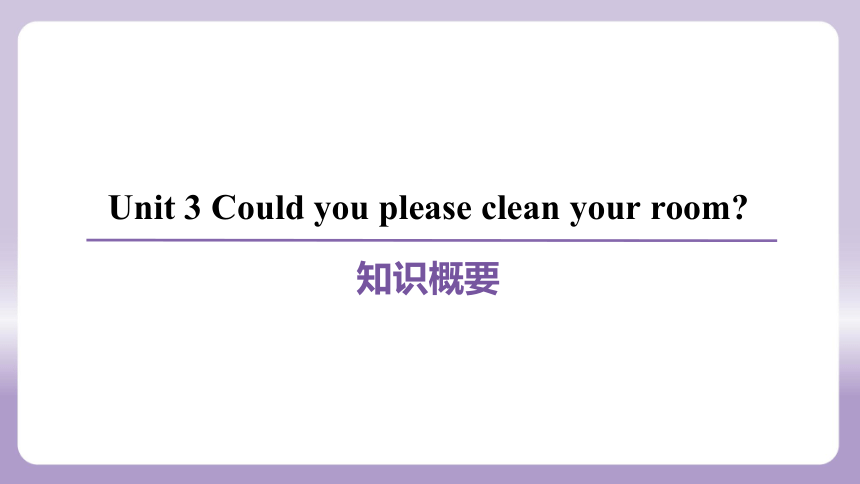
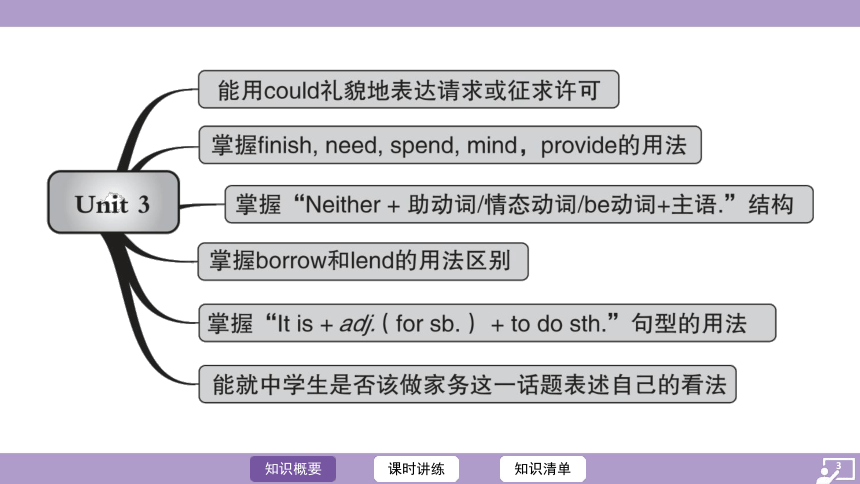

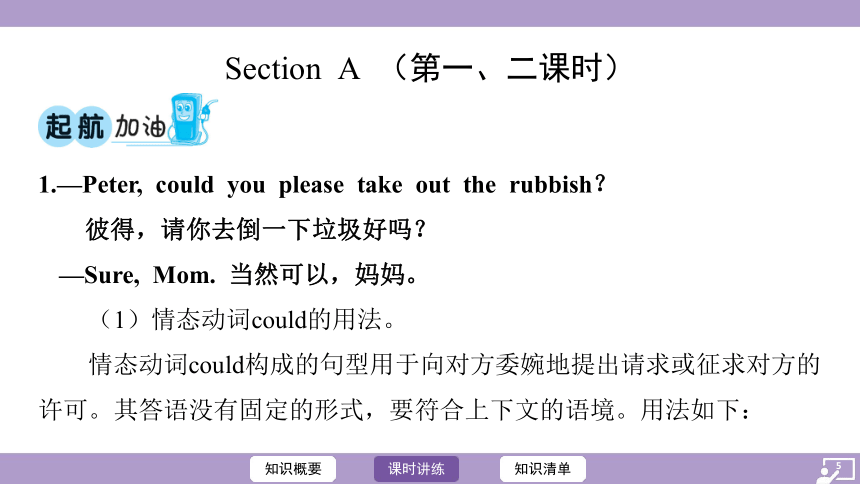
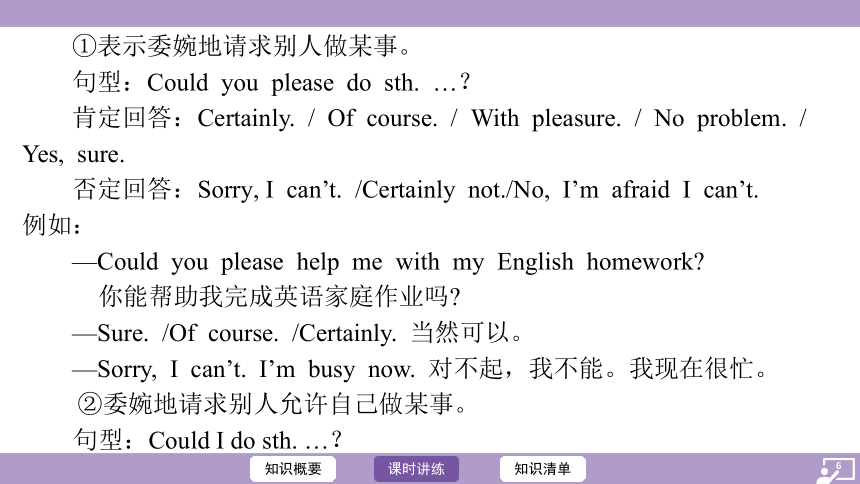
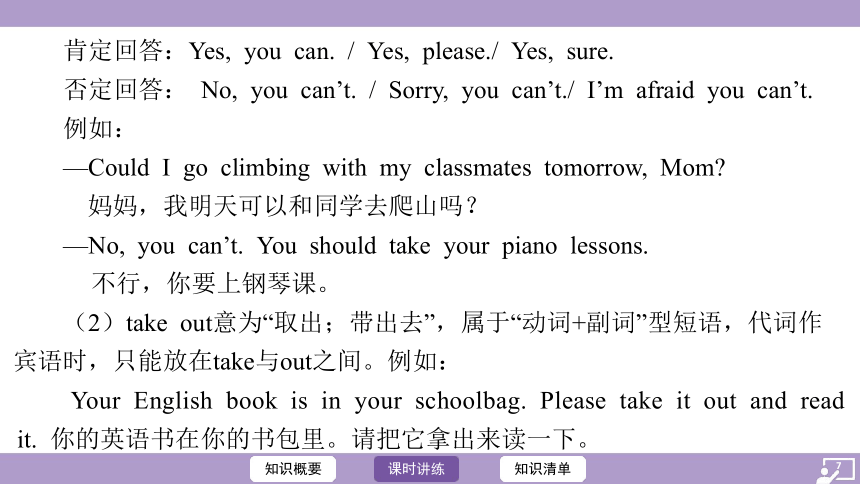
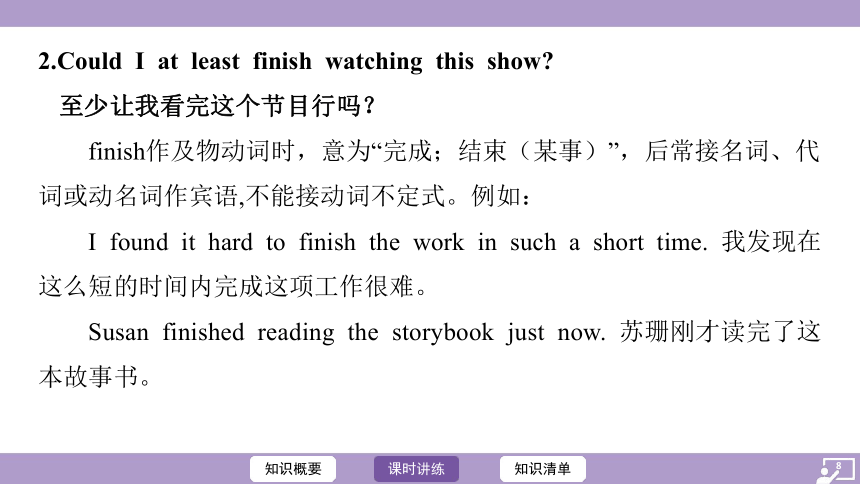
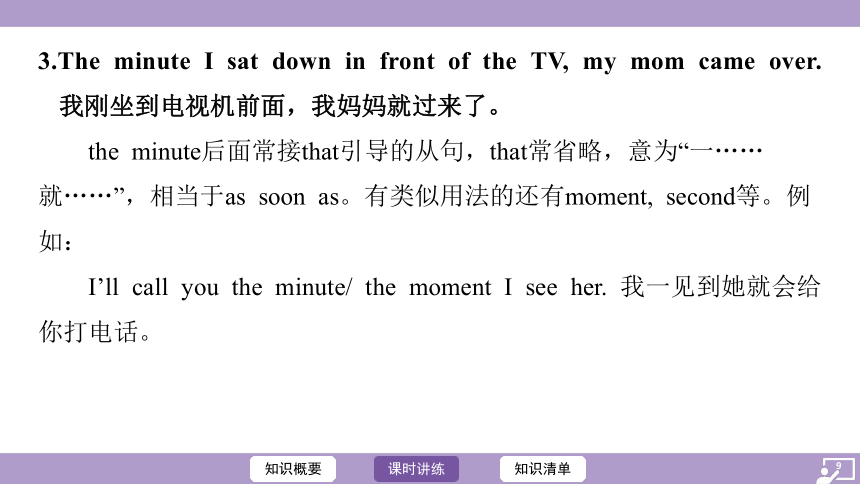

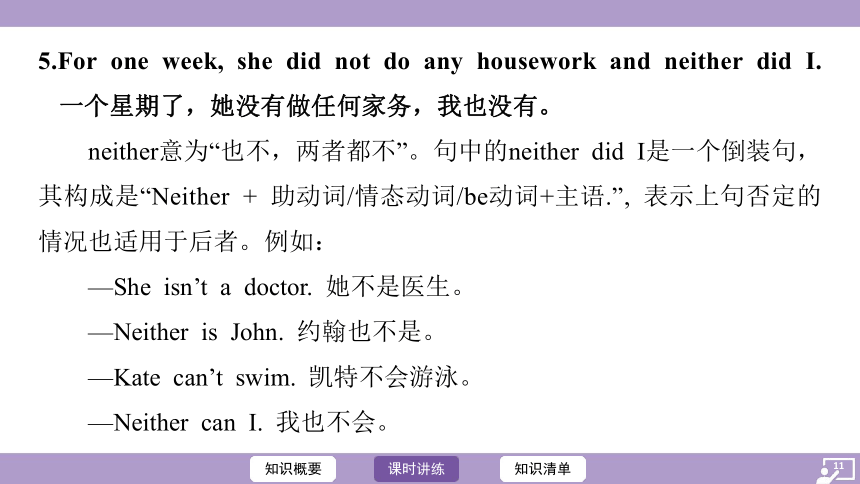
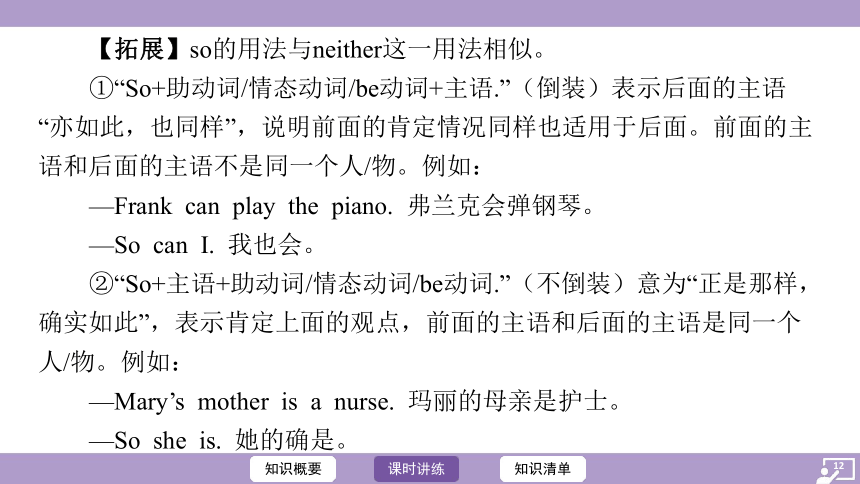
文档简介
(共74张PPT)
Unit 3 Could you please clean
your room
Unit 3 Could you please clean your room
知识概要
Unit 3 Could you please clean your room
课时讲练
Section A (第一、二课时)
1.—Peter, could you please take out the rubbish?
彼得,请你去倒一下垃圾好吗?
—Sure, Mom. 当然可以,妈妈。
(1)情态动词could的用法。
情态动词could构成的句型用于向对方委婉地提出请求或征求对方的许可。其答语没有固定的形式,要符合上下文的语境。用法如下:
①表示委婉地请求别人做某事。
句型:Could you please do sth. …?
肯定回答:Certainly. / Of course. / With pleasure. / No problem. /
Yes, sure.
否定回答:Sorry, I can’t. /Certainly not./No, I’m afraid I can’t.
例如:
—Could you please help me with my English homework
你能帮助我完成英语家庭作业吗
—Sure. /Of course. /Certainly. 当然可以。
—Sorry, I can’t. I’m busy now. 对不起,我不能。我现在很忙。
②委婉地请求别人允许自己做某事。
句型:Could I do sth. …?
肯定回答:Yes, you can. / Yes, please./ Yes, sure.
否定回答: No, you can’t. / Sorry, you can’t./ I’m afraid you can’t.
例如:
—Could I go climbing with my classmates tomorrow, Mom
妈妈,我明天可以和同学去爬山吗?
—No, you can’t. You should take your piano lessons.
不行,你要上钢琴课。
(2)take out意为“取出;带出去”,属于“动词+副词”型短语,代词作宾语时,只能放在take与out之间。例如:
Your English book is in your schoolbag. Please take it out and read it. 你的英语书在你的书包里。请把它拿出来读一下。
2.Could I at least finish watching this show
至少让我看完这个节目行吗?
finish作及物动词时,意为“完成;结束(某事)”,后常接名词、代词或动名词作宾语,不能接动词不定式。例如:
I found it hard to finish the work in such a short time. 我发现在这么短的时间内完成这项工作很难。
Susan finished reading the storybook just now. 苏珊刚才读完了这本故事书。
3.The minute I sat down in front of the TV, my mom came over. 我刚坐到电视机前面,我妈妈就过来了。
the minute后面常接that引导的从句,that常省略,意为“一……就……”,相当于as soon as。有类似用法的还有moment, second等。例如:
I’ll call you the minute/ the moment I see her. 我一见到她就会给你打电话。
4.I’m just as tired as you are!我和你一样累!
“as… as”意为 “和……一样”,表示同级的比较。使用时要注意第一个as为副词,第二个as为连词。其基本结构为“as+形容词或副词原级+as”。例如:
This movie is as interesting as that one. 这部电影和那部电影一样有趣。
Jack speaks English as well as Dick. 杰克的英语说得和迪克的一样好。
5.For one week, she did not do any housework and neither did I. 一个星期了,她没有做任何家务,我也没有。
neither意为“也不,两者都不”。句中的neither did I是一个倒装句,其构成是“Neither + 助动词/情态动词/be动词+主语.”, 表示上句否定的情况也适用于后者。例如:
—She isn’t a doctor. 她不是医生。
—Neither is John. 约翰也不是。
—Kate can’t swim. 凯特不会游泳。
—Neither can I. 我也不会。
【拓展】so的用法与neither这一用法相似。
①“So+助动词/情态动词/be动词+主语.”(倒装)表示后面的主语“亦如此,也同样”,说明前面的肯定情况同样也适用于后面。前面的主语和后面的主语不是同一个人/物。例如:
—Frank can play the piano. 弗兰克会弹钢琴。
—So can I. 我也会。
②“So+主语+助动词/情态动词/be动词.”(不倒装)意为“正是那样,确实如此”,表示肯定上面的观点,前面的主语和后面的主语是同一个人/物。例如:
—Mary’s mother is a nurse. 玛丽的母亲是护士。
—So she is. 她的确是。
6.My mom came over as soon as I sat down in front of the TV. 我一坐在电视机前,妈妈就过来了。
as soon as意为“一……就……”,其用法如下:
(1)指未发生的动作时,主句用一般将来时,从句用一般现在时代替一般将来时。例如:
I’ll call you as soon as I arrive there. 我一到那儿就会给你打电话。
(2)指紧接着发生的两个短暂动作, 主从句都用一般过去时。例如:
Linda took out her English book as soon as she sat down.
琳达一坐下就拿出她的英语书。
7.Could I borrow that book 我能借那本书吗?
Could you lend me some money 你能借给我一些钱吗?
【辨析】borrow,lend与keep的用法区别。
这三个词都有“借”的意思,但它们的含义和用法有所不同。
单词 释义 用 法
borrow 借入 把本来不属于自己的东西借来暂时使用,指向别人借东西,常与介词from连用。
lend 借出 把属于自己的东西借给别人暂时使用, 常与介词to连用,也可以跟双宾语。
keep 借 通常和“for+一段时间”连用,表示“借某物多长时间”。
例如:
—I left my dictionary at home. Can I borrow yours, please
我把字典忘在家里了。我能借你的吗
—Of course. 当然。
Helen lent her camera to me. = Helen lent me her camera.
海伦把她的照相机借给了我。
You can keep this novel for two weeks.
你可以借这本小说两个星期。
一、单项选择。
( ) 1.—Excuse me, could you help me with the heavy bag
—______
C
A.Yes, I could. B.It doesn’t matter. C.Of course.
( ) 2.Here are some apples. Could you please ________
C
A.take out it B.take it out C.take them out
( ) 3.“What happened ” she asked ________ surprise.
B
A.on B.in C.with
( ) 4.—I don’t like playing baseball. It’s boring.
—________
A
A.Neither do I. B.Neither I do. C.So do I.
小锦囊 “Neither+助动词/be动词/情态动词+主语.”表示前面叙述的否定
情况也适合另一主语。“So+助动词/be动词/情态动词+主语.”表示前面
叙述的肯定情况也适合另一主语。
( ) 5.You need ________ good care of your brother.
C
A.takes B.took C.to take
( ) 6.My father was reading a newspaper ________ my mother
was listening to music.
B
A.during B.while C.before
( ) 7.I will tell her the news as soon as she ________ back.
B
A.come B.comes C.came
小锦囊 as soon as引导的时间状语从句在时态上遵循“主将从现”的原
则,即主句用一般将来时,从句用一般现在时表示将来。
( ) 8.You can watch TV after finishing ________ the floor.
C
A.sweep B.to sweep C.sweeping
( ) 9.Lucy is ________ her twin sister. They are both 1. 65
meters tall.
C
A.shorter than B.taller than C.as tall as
小锦囊 “as+形容词或副词的原级+as” 用于同级比较。
( ) 10.I ______ some CDs ______ Eric last week. And I will
give them back next week.
A
A.borrowed; from B.borrowed; to C.lent; to
二、根据汉语提示,写出正确的单词完成句子。
1.Look! The girls are _________(打扫) the floor in the classroom.
2.Could you please _____(递给) me a box of milk
3.Frank bought two new ______(衬衣) yesterday.
4.We should ______(扔) the rubbish into the dustbin.
5.The telephone rang ______(当……的时候) I was reading a newspaper.
sweeping
pass
shirts
throw
while
三、用括号内所给单词的正确形式填空。
1.I will give her the gift as soon as she_______(arrive).
2.There are five_______(finger)on each hand.
3.I finished _________(watch) the new movie last night.
4.Could you please not_____(play) football in the street
It’s too dangerous.
arrives
fingers
watching
play
5.The bedroom is very dirty and it needs ________(clean).
6.Neither of us _____(like) junk food.
7.Can you write as _________(care) as she does
8.If Peter ________(catch) the early bus, he will get there on time.
cleaning
likes
carefully
catches
四、从方框中选出恰当的选项,补全对话。有一项多余。
A: Jimmy, could you please help me get some water
B: Yes, of course. _1.(____)
A: I’m washing my clothes.
E
A. Do you like washing clothes
B. Thanks a lot.
C. They are interesting for me.
D. What do you think of washing clothes
E. What are you doing now
F. But I like other chores.
B: Oh, you have so many dirty clothes. _2.(____)
A: No, I don’t. I think it’s tiring. What about you
B: I don’t like washing clothes, either. _3.(____)
A: What chores do you like
B: I like to do the dishes and make the bed. _4.(____)
A
F
A. Do you like washing clothes
B. Thanks a lot.
C. They are interesting for me.
D. What do you think of washing clothes
E. What are you doing now
F. But I like other chores.
C
A: Do you like cleaning the windows
B: Yes. I often help my mother clean the windows.
A: You are a good boy!
B: _5.(____)
B
A. Do you like washing clothes
B. Thanks a lot.
C. They are interesting for me.
D. What do you think of washing clothes
E. What are you doing now
F. But I like other chores.
五、从方框中选择恰当的单词,并用其正确形式填空。每个单词只
能用一次。
do show three school try different like usual if how
As students, we are always busy studying. Many of us get used to having supper as soon as we get home from 1. .. Not all children like to do the housework. They think 2. . the housework is their parents’ job.
In fact, doing the housework isn’t a bad thing. Firstly, it’s a good way to relax ourselves. Many children 3. . to spend much time watching TV or playing computer games when they are tired. As a result, they usually get more tired.
school
doing
like
But doing the housework is 4. .. It is easy and it can let our tense (紧张的) mind relax. Secondly, doing some housework can
5. . our care for our parents. We know our parents are 6. . tired after a day’s work. They will feel happy 7. . we can help them clean the floor or cook supper. 8. ., we can find it very interesting to do the housework. I’m sure you must be glad to see the bright dishes and the clean rooms. At the same time, learning 9. . to do the housework is a great thing.
So 10. . your best to do the housework from now on! You will get a lot from it.
different
show
usually
if
Thirdly
do show three school try different like usual if how
how
try
Section B (第三、四课时)
1.Could I invite my friends to a party
我可以邀请我的朋友来参加聚会吗?
invite是动词,意为“邀请”。其名词形式为invitation。invite常用于以下结构中。
(1)invite sb. to some place意为“邀请某人去某地”。例如:
I invited Jack to my house. 我邀请杰克来我家。
(2)invite sb. to do sth. 意为“邀请某人做某事”。例如:
Last Sunday Sally invited me to go to her birthday party.
上星期天萨莉邀请我去参加她的生日聚会。
2.Housework is a waste of their time.
做家务活是浪费他们的时间的事。
a waste of time意为“浪费时间”。waste在此处作名词,意为“浪费”。常见用法如下。
(1)waste作名词,还可表示“垃圾;废弃物”,常用其复数形式wastes。例如:
Her idle talk is just a waste of time. 她的空谈简直就是浪费时间。
(2)waste还可作动词,意为“浪费;滥用”,其反义词为save。例如:
The teacher always tells us not to waste time playing computer games. 老师总是告诉我们不要浪费时间玩电脑游戏。
(3)waste还可作形容词,意为“废弃的;毁坏的;无用的”。例如:
Don’t throw waste paper about. 不要乱扔废纸。
3.They should spend their time on schoolwork in order to get good grades and get into a good university. 为了取得好成绩,进入一所好大学,他们应该把时间花在学业上。
(1)spend作动词,意为“花费”,其主语必须是人,句式:
sb. spend(s) some time/money on sth. 或 sb. spend(s) some time/money in doing sth. ,其中介词in可以省略,意为“某人在某事花费(钱/时间);某人花(钱/时间)做某事”。例如:
My sister spent one and a half hours on her homework yesterday. 我妹妹昨天花了一个半小时做家庭作业。
The boy spent one hour practicing the guitar last night. 那个男孩昨晚花了一个小时练习吉他。
(2)in order to意为“为了”,表示目的,其位置在句首和句中均可,其后接动词原形。否定结构为in order not to。例如:
Tom studies hard in order to pass the final exam. 为了通过期末考试,汤姆学习很努力。
In order not to be late for school,Linda gets up at seven every morning. 为了上学不迟到,琳达每天早晨七点钟就起床。
4.And anyway, I think doing chores is not so difficult.
而且我认为做家务不是那么难。
anyway的用法。
(1)副词,意为“而且;加之;反正”。例如:
This shirt is too expensive and anyway the size is too small. 这件衬衫太贵,而且尺寸也太小。
(2)副词,意为“无论如何;不管怎样”。例如:
Anyway,we must finish this project today. 无论如何,我们今天必须完成这个项目。
5.I do not mind doing them. 我不介意做它们(家务)。
mind在句中作动词,意为“介意;反对”,一般用于否定句和疑问句中,不用于进行时,其后可接名词、代词、动名词或if/that/wh-从句。mind 作动词时多用于以下句型。
(1)“sb. don’t/doesn’t/didn’t mind… ”意为 “(某人)不介意……”。 例如:
He doesn’t mind playing football. 他不介意踢足球。
(2)“Do you mind… ”意为“你介意……吗?”。例如:
Do you mind closing the window 你介意关上窗吗?
(3)“Do/Would you mind if I… ” 意为“如果我……你介意吗?”。例如:
Do/Would you mind if I used your dictionary for a while 你介意我用你的字典一会儿吗?
(4)“Would you mind not doing… ” 意为“请你不要……好吗?”。例如:
Would you mind not wasting your time 请你不要浪费你的时间好吗?
6.It’s not enough to just get good grades at school. 仅仅在学校取得好成绩是不够的。
“It is (not) + adj. (for sb.) + to do sth.”是一个常用的句型,it为形式主语,真正的主语是后面的动词不定式。例如:
It is not easy to learn a foreign language well. 学好一门外语是不容易的。
7.Since they live in one house with their parents, they should know that everyone should do their part in keeping it clean and tidy. 既然他们与父母一起住在一所房子里,他们就应该知道每个人应当尽一份力来保持房子干净和整洁。
(1)since在句中作连词,意为“因为;既然”,引导原因状语从句,常位于句首。例如:
Since you don’t know the girl, I will ask someone else. 既然你不认识这个女孩,我就去问问别人。
Since it is late, I shall go home now. 因为晚了,我现在要回家了。
(2)do one’s part 意为“尽自己的职责;尽自己本分;尽自己一份力量”。例如:
Everyone should do his part in saving water. 每个人都应该为节约用水尽自己的一份力量。
8.The earlier kids learn to be independent, the better it is for their future. 孩子们越早学会独立,对他们的将来就越好。
“the+比较级,the+比较级”的结构表示“越……就越……”。例如:
The more,the better. 越多越好。
The more you practise English,the better you will speak it.
你英语练习得越多,你说得就越好。
The more careful you are, the fewer mistakes you will make.
你越仔细,犯的错误越少。
【拓展】“get/become+形容词比较级+and+形容词比较级”表示“变得越来越……”,and连接同一个形容词的比较级。当表示“越来越……”,形容词为多音节词或一些双音节词时,用“more and more+形容词原级”。例如:
It gets warmer and warmer when spring comes.
春天来了,天气变得越来越暖和了。
China becomes more and more popular with people from many foreign countries. 中国越来越受到许多国家的人们的欢迎。
一、单项选择。
( ) 1.Could you please ____ my pet dog when I’m out
C
A.work on B.look for C.take care of
( ) 2.—Is Nancy ________ these days
—Yes. She is still in hospital now.
A
A.ill B.strong C.happy
( ) 3.I don’t mind ________ you if you are in trouble.
C
A.help B.to help C.helping
( ) 4.The good news made us________excited.
A
A.feel B.feeling C.to feel
( ) 5.—Will you go to the mountain tomorrow
—It ________ the weather. If it’s fine, I’ll go there.
B
A.decides on B.depends on C.goes on
( ) 6.I’m interested in animals, so I ________ some of my free
time working in an animal hospital.
C
A.pay B.cost C.spend
( ) 7.—Could you tell me why you learn maths so well
—It’s very simple. ________ you study, ________ grades you
will get.
C
A.Harder; the better B.The harder; better C.The harder; the better
小锦囊
“the+比较级,the+比较级”的结构表示“越……,就越……”。
( ) 8.There is no need for you ________ out late.
B
A.stay B.to stay C.staying
( ) 9.The rich man ________ the poor families ________ much
food after the earthquake happened.
A
A.provided; with B.provided; for C.provides; to
( ) 10.It’s important for us________ English well.
C
A.learn B.learning C.to learn
二、根据汉语提示,写出正确的单词完成句子。
1.Frank, I feel ___(生病的), so I have to see a doctor.
2.Don’t give her too much ______(压力). She is already hard-working.
3.Mother thinks playing computer games is a ______(浪费) of time.
4.We haven’t decided where to go. It ________(依靠) on the weather.
5.The dress is a little expensive and ________(而且), I don’t like
its style.
ill
stress
waste
depends
anyway
6.______ (既然) the rain has stopped, let’s go for a walk.
7.The old man ________(掉下) his cup and broke it.
8.As time passed, Sophie and I __________(发展) a real friendship.
9.Our teachers are _____(公正的) to everybody in our class.
10.My__________(邻居) are very friendly and helpful.
Since
dropped
developed
fair
neighbors
三、用括号内所给单词的正确形式填空。
1.Would you mind _______(put) the bike here
2.Betty always thinks it’s _______(fair) for her to do so much
housework.
3.It’s necessary for kids to be ___________(independence).
4.In fact, young people have too much______(stress) today.
5.The harder you work, the______(much) progress you will get.
putting
unfair
independent
stress
more
6.For students, it is important ___________(develop) good study skills.
7.The light music made me _____(feel) comfortable.
8.You’d better spend more time _______(talk) with your parents so
that they can understand you.
9.My mother bought some _______(snack) for me yesterday.
10.I didn’t receive the _________(invite) of the party, so I didn’t go.
to develop
feel
talking
snacks
invitation
四、从方框内选择适当的单词,并用其正确形式填空。每个单词只
能用一次。
care if cook alone sweep satisfy however become together easy
Most students do not enjoy doing housework. Some of them think that cleaning the bathroom or 1. . dinner for the family is boring. 2. ., if you try the following ways, you will find that housework is not as boring as you think.
Learn to do small things.
cooking
However
You should learn to do small things. For example, you can do the dishes, 3. . the floor or make the bed. Part of growing up is to be able to take 4. . of yourself. Doing some small things around the house shows that you are 5. . responsible (有责任感的).
Divide (划分) housework among the family.
sweep
care
becoming
care if cook alone sweep satisfy however become together easy
In fact, it’s too tiring for one person to do all the housework 6. .. It’s good to divide housework into different parts. All the family members will do the housework 7. .. Dividing housework among all the family members will make everyone’s job much 8. ..
Make it fun.
Cooking is one part of housework. Cooking can be very funny 9. . you put your heart into it. If you learn how to cook your favorite food,you will also get a feeling of 10. ..
easier
if
satisfaction
alone
together
care if cook alone sweep satisfy however become together easy
Self Check (第五课时)
本单元以“家务”为话题展开,重点学习了情态动词could表示委婉地请求、许可的用法,以及对“青少年在家应不应该做家务”这一话题进行讨论。在写作时,要求同学们会用“I think/believe that…”“I agree/
disagree that…”等表达自己的观点。
用于这个话题作文的重点句型:
(1)I think/believe that… 我认为/我相信……
(2)It’s unfair that… ……是不公平的。
(3)I agree /disagree that… 我同意/不同意……
(4)I like… but I hate… 我喜欢……但是讨厌……
(5)For example,… 例如,……
一、从方框中选择恰当的选项,补全对话。有一项多余。
A: Hello,Victor. I have many chores to do today. . .1.(__)_
B: Sure! What do you want me to do
E
A. No problem.
B. What’s up
C. Anything else
D. I like to look after dogs.
E. Could you please help me with them
F. Where do you want to put it
A: I’m going to have a party at home. Could you please help me
clean the living room
B:. .2.(_)_
A: Oh,I also want to move the desk away.
B: . .3.(_)_
A: I want to put it next to the window.
F
A
A. No problem.
B. What’s up
C. Anything else
D. I like to look after dogs.
E. Could you please help me with them
F. Where do you want to put it
B: . .4.(_)
A: Oh, my dog. Could you help me feed it
B: OK. . .5.(_)
A: Thank you very much.
B: Not at all.
C
D
A. No problem.
B. What’s up
C. Anything else
D. I like to look after dogs.
E. Could you please help me with them
F. Where do you want to put it
二、完形填空。
What do you think of doing chores In fact, very. .1. . people like doing chores around the house. . .2. ., we all know that people must do them. Kids living in Washington have chores . .3. . to help their family every day. The chores are different . .4. . different kids. Parents often show them . .5. . to do different chores.
. .6. . is good for parents to teach their children to do chores at an early age. Many parents think chores are . .7. . for children—even very young ones. Doing chores . .8. . children many important skills. Chores . .9. . teach children about fairness and commitment (承担义务). The skills and values (价值) learned . .10. . doing chores will be good for children throughout their lives.
( ) 1.A.much B.many C.few
C
( ) 2.A.So B.However C.Though
B
( ) 3.A.do B.does C.to do
C
( ) 4.A.in B.for C.from
B
( ) 5.A.how B.what C.which
A
( ) 6.A.This B.That C.It
C
( ) 7.A.boring B.free C.important
C
( ) 8.A.teaches B.to teach C.teach
A
( ) 9.A.too B.either C.also
C
( ) 10.A.at B.by C.to
B
三、阅读理解。
In some Western countries, many children do chores to get pocket money. They usually start to do this when they are ten years old.
School students have to do homework and study for tests. They don’t have much free time on weekdays. They often do chores on weekends. Young kids only do easy chores. So they don’t get much money. But that’s enough. Many of them only want to buy candies. And candies are cheap! They often help do the dishes, sweep the floor, or feed the pet cat or dog.
When they get older, they want to buy more and more things. They want things that are more expensive than candies. So they have to work harder! They often help their parents wash the family car, cut the grass, or cook meals.
Some jobs are a good way for kids to learn new things. For example, they can learn how to use a lawnmower(割草机) or how to cook. Of course, their parents help them at first.
根据短文内容,选择正确答案。
( ) 1.How do many children get pocket money in some Western
countries
A
A.They do chores.
B.They study hard.
C.They ask their parents for it.
( ) 2.When do many children usually begin to do chores in some
Western countries
C
A.At the age of 8. B.At the age of 9. C.At the age of 10.
( ) 3.When do school students often do chores in some Western
countries
C
A.On Tuesdays. B.On Thursdays. C.On Sundays.
( ) 4.Simon wants to get more pocket money to buy something
expensive. He may ________.
B
A.sweep the floor B.cut the grass C.feed the pet cat
( ) 5.Which of the following sentences is NOT right
C
A.Doing jobs can help kids learn new things.
B.When the kids are older,they often wash the family car.
C.The kids don’t work hard because they can get more pocket money.
四、书面表达。
请你根据要点提示及要求,以“Let’s help our parents do chores”为题,
写一篇70词左右的英文倡议书。开头和结尾已给出,不计入总词数。
要点提示:
1.父母工作繁忙,我们应该分担家务;
2.我们可以做的家务有扫地、整理床铺、洗餐具、洗衣服、浇花、
倒垃圾等。
Let’s help our parents do chores
Dear students,
Helping our parents do chores is one of the best ways to care
about them.
Doing chores is not difficult, but it means a lot. From now on,
let’s help our parents do chores.
One possible version:
Let’s help our parents do chores
Dear students,
Helping our parents do chores is one of the best ways to care
about them. Our parents are always busy with work. They are tired
after work, but they still have to do chores. If we help them do some
chores, they will have more time to rest. And sharing housework can
help us understand our parents better. So we should help them do
housework as much as we can. In fact, we can do much housework at
home. For example, we could sweep the floor, make the bed, do the
dishes, wash clothes, water flowers and take out the trash.
Doing chores is not difficult, but it means a lot. From now on,
let’s help our parents do chores.
Unit 3 Could you please clean your room
知识清单
Unit 3
重点短语
1.___________________________洗盘子
do the dishes = wash the dishes
2.___________________倒垃圾
take out the rubbish
3._______________叠衣服
fold the clothes
4._______________扫地
sweep the floor
5._______________整理某人的床
make one’s bed
6.___________________打扫客厅
clean the living room
7.________________出去吃晚饭
go out for dinner
8._____________在外面待到很晚
stay out late
9.__________搭车
get a ride
10.____________________在电脑上工作
work on the computer
11._______________________帮助解决几件事
help out with a few things
12._________至少
at least
13.________________完成做某事
finish doing sth.
14._______________________讨厌做某事
hate to do sth. /doing sth.
15._________________________因某事和某人生气
be angry with sb. about sth.
16._________________解决问题
solve the problem
17._____________扔掉
throw down
18.___________走过来
come over
19._____________________遛狗
take the dog for a walk
20._________和……一样
as…as
21.____________频繁;反复
all the time
22.___________吃惊地
in surprise
23._____________我们俩都不
neither of us
24.___________一……就……
as soon as
25.________________在电视的前面
in front of the TV
26._________________________把某物传给/递给某人
pass sb. sth. = pass sth. to sb.
27.___________________从某人那借来某物
borrow sth. from sb.
28._________________________把某物借给某人
lend sb. sth. = lend sth. to sb.
29.____________邀请某人到……
invite sb. to
30.________________让某人做某事
make sb. do sth.
31.___________帮助
help...with
32._______________________花费时间在学业上
spend time on schoolwork
33.___________目的是;为了
in order to
34.___________________________________为某人提供某物
provide sb. with sth. =provide sth. for sb.
35.___________做家务
do chores
36.________________介意做某事
mind doing sth.
37.____________依靠;信赖
depend on
38.___________________总是做某事
be always doing sth.
39.____________________________提高孩子的独立性
develop children’s independence
40._____________________照顾;处理
take care of =look after
41._______________在……方面尽一份力
do one’s part in
42.___________结果;因此
as a result
43._____________浏览
look through
44._________________________浪费时间
a waste of time =waste time
45._______生病
fall ill
—Sure. / Sorry, I can’t. I have to finish homework first.
重点句型
1.___________________________________请你去倒一下垃圾好吗?
—Could you please take out the rubbish
______________________________________________
当然可以。/对不起,我不能。我必须先完成作业。
2.__________________________我能用一下你的电脑吗?
—Could I use your computer
_______________________________对不起。我现在要用它工作。
—Sorry. I’m going to work on it now.
3._____________________________________
她不做任何家务。我也不做。
She didn’t do any housework. Neither did I.
4._____________________________对于某人来说做某事是没有必要的。
There is no need for sb. to do sth.
5._______________________________(对某人来说)做某事是重要的。
It’s important (for sb.) to do sth.
6.____________________________________________________________
The earlier kids learn to be independent, the better it’s for their future.
孩子们越早学会独立,对他们的未来就越好。
语法要点
1. 用could有礼貌地提出请求。
2. 含if引导的条件状语从句的复合句中,当主句是一般将来时,条件状
语从句的谓语动词要用一般现在时表示将来。
3. “Neither +助动词/情态动词/be动词+ 主语”结构。
4. “the+比较级,the+比较级”的结构表示“越……就越……”。
5. 掌握“It is + adj. (for sb.) + to do sth.”句型的用法。
Unit 3 Could you please clean
your room
Unit 3 Could you please clean your room
知识概要
Unit 3 Could you please clean your room
课时讲练
Section A (第一、二课时)
1.—Peter, could you please take out the rubbish?
彼得,请你去倒一下垃圾好吗?
—Sure, Mom. 当然可以,妈妈。
(1)情态动词could的用法。
情态动词could构成的句型用于向对方委婉地提出请求或征求对方的许可。其答语没有固定的形式,要符合上下文的语境。用法如下:
①表示委婉地请求别人做某事。
句型:Could you please do sth. …?
肯定回答:Certainly. / Of course. / With pleasure. / No problem. /
Yes, sure.
否定回答:Sorry, I can’t. /Certainly not./No, I’m afraid I can’t.
例如:
—Could you please help me with my English homework
你能帮助我完成英语家庭作业吗
—Sure. /Of course. /Certainly. 当然可以。
—Sorry, I can’t. I’m busy now. 对不起,我不能。我现在很忙。
②委婉地请求别人允许自己做某事。
句型:Could I do sth. …?
肯定回答:Yes, you can. / Yes, please./ Yes, sure.
否定回答: No, you can’t. / Sorry, you can’t./ I’m afraid you can’t.
例如:
—Could I go climbing with my classmates tomorrow, Mom
妈妈,我明天可以和同学去爬山吗?
—No, you can’t. You should take your piano lessons.
不行,你要上钢琴课。
(2)take out意为“取出;带出去”,属于“动词+副词”型短语,代词作宾语时,只能放在take与out之间。例如:
Your English book is in your schoolbag. Please take it out and read it. 你的英语书在你的书包里。请把它拿出来读一下。
2.Could I at least finish watching this show
至少让我看完这个节目行吗?
finish作及物动词时,意为“完成;结束(某事)”,后常接名词、代词或动名词作宾语,不能接动词不定式。例如:
I found it hard to finish the work in such a short time. 我发现在这么短的时间内完成这项工作很难。
Susan finished reading the storybook just now. 苏珊刚才读完了这本故事书。
3.The minute I sat down in front of the TV, my mom came over. 我刚坐到电视机前面,我妈妈就过来了。
the minute后面常接that引导的从句,that常省略,意为“一……就……”,相当于as soon as。有类似用法的还有moment, second等。例如:
I’ll call you the minute/ the moment I see her. 我一见到她就会给你打电话。
4.I’m just as tired as you are!我和你一样累!
“as… as”意为 “和……一样”,表示同级的比较。使用时要注意第一个as为副词,第二个as为连词。其基本结构为“as+形容词或副词原级+as”。例如:
This movie is as interesting as that one. 这部电影和那部电影一样有趣。
Jack speaks English as well as Dick. 杰克的英语说得和迪克的一样好。
5.For one week, she did not do any housework and neither did I. 一个星期了,她没有做任何家务,我也没有。
neither意为“也不,两者都不”。句中的neither did I是一个倒装句,其构成是“Neither + 助动词/情态动词/be动词+主语.”, 表示上句否定的情况也适用于后者。例如:
—She isn’t a doctor. 她不是医生。
—Neither is John. 约翰也不是。
—Kate can’t swim. 凯特不会游泳。
—Neither can I. 我也不会。
【拓展】so的用法与neither这一用法相似。
①“So+助动词/情态动词/be动词+主语.”(倒装)表示后面的主语“亦如此,也同样”,说明前面的肯定情况同样也适用于后面。前面的主语和后面的主语不是同一个人/物。例如:
—Frank can play the piano. 弗兰克会弹钢琴。
—So can I. 我也会。
②“So+主语+助动词/情态动词/be动词.”(不倒装)意为“正是那样,确实如此”,表示肯定上面的观点,前面的主语和后面的主语是同一个人/物。例如:
—Mary’s mother is a nurse. 玛丽的母亲是护士。
—So she is. 她的确是。
6.My mom came over as soon as I sat down in front of the TV. 我一坐在电视机前,妈妈就过来了。
as soon as意为“一……就……”,其用法如下:
(1)指未发生的动作时,主句用一般将来时,从句用一般现在时代替一般将来时。例如:
I’ll call you as soon as I arrive there. 我一到那儿就会给你打电话。
(2)指紧接着发生的两个短暂动作, 主从句都用一般过去时。例如:
Linda took out her English book as soon as she sat down.
琳达一坐下就拿出她的英语书。
7.Could I borrow that book 我能借那本书吗?
Could you lend me some money 你能借给我一些钱吗?
【辨析】borrow,lend与keep的用法区别。
这三个词都有“借”的意思,但它们的含义和用法有所不同。
单词 释义 用 法
borrow 借入 把本来不属于自己的东西借来暂时使用,指向别人借东西,常与介词from连用。
lend 借出 把属于自己的东西借给别人暂时使用, 常与介词to连用,也可以跟双宾语。
keep 借 通常和“for+一段时间”连用,表示“借某物多长时间”。
例如:
—I left my dictionary at home. Can I borrow yours, please
我把字典忘在家里了。我能借你的吗
—Of course. 当然。
Helen lent her camera to me. = Helen lent me her camera.
海伦把她的照相机借给了我。
You can keep this novel for two weeks.
你可以借这本小说两个星期。
一、单项选择。
( ) 1.—Excuse me, could you help me with the heavy bag
—______
C
A.Yes, I could. B.It doesn’t matter. C.Of course.
( ) 2.Here are some apples. Could you please ________
C
A.take out it B.take it out C.take them out
( ) 3.“What happened ” she asked ________ surprise.
B
A.on B.in C.with
( ) 4.—I don’t like playing baseball. It’s boring.
—________
A
A.Neither do I. B.Neither I do. C.So do I.
小锦囊 “Neither+助动词/be动词/情态动词+主语.”表示前面叙述的否定
情况也适合另一主语。“So+助动词/be动词/情态动词+主语.”表示前面
叙述的肯定情况也适合另一主语。
( ) 5.You need ________ good care of your brother.
C
A.takes B.took C.to take
( ) 6.My father was reading a newspaper ________ my mother
was listening to music.
B
A.during B.while C.before
( ) 7.I will tell her the news as soon as she ________ back.
B
A.come B.comes C.came
小锦囊 as soon as引导的时间状语从句在时态上遵循“主将从现”的原
则,即主句用一般将来时,从句用一般现在时表示将来。
( ) 8.You can watch TV after finishing ________ the floor.
C
A.sweep B.to sweep C.sweeping
( ) 9.Lucy is ________ her twin sister. They are both 1. 65
meters tall.
C
A.shorter than B.taller than C.as tall as
小锦囊 “as+形容词或副词的原级+as” 用于同级比较。
( ) 10.I ______ some CDs ______ Eric last week. And I will
give them back next week.
A
A.borrowed; from B.borrowed; to C.lent; to
二、根据汉语提示,写出正确的单词完成句子。
1.Look! The girls are _________(打扫) the floor in the classroom.
2.Could you please _____(递给) me a box of milk
3.Frank bought two new ______(衬衣) yesterday.
4.We should ______(扔) the rubbish into the dustbin.
5.The telephone rang ______(当……的时候) I was reading a newspaper.
sweeping
pass
shirts
throw
while
三、用括号内所给单词的正确形式填空。
1.I will give her the gift as soon as she_______(arrive).
2.There are five_______(finger)on each hand.
3.I finished _________(watch) the new movie last night.
4.Could you please not_____(play) football in the street
It’s too dangerous.
arrives
fingers
watching
play
5.The bedroom is very dirty and it needs ________(clean).
6.Neither of us _____(like) junk food.
7.Can you write as _________(care) as she does
8.If Peter ________(catch) the early bus, he will get there on time.
cleaning
likes
carefully
catches
四、从方框中选出恰当的选项,补全对话。有一项多余。
A: Jimmy, could you please help me get some water
B: Yes, of course. _1.(____)
A: I’m washing my clothes.
E
A. Do you like washing clothes
B. Thanks a lot.
C. They are interesting for me.
D. What do you think of washing clothes
E. What are you doing now
F. But I like other chores.
B: Oh, you have so many dirty clothes. _2.(____)
A: No, I don’t. I think it’s tiring. What about you
B: I don’t like washing clothes, either. _3.(____)
A: What chores do you like
B: I like to do the dishes and make the bed. _4.(____)
A
F
A. Do you like washing clothes
B. Thanks a lot.
C. They are interesting for me.
D. What do you think of washing clothes
E. What are you doing now
F. But I like other chores.
C
A: Do you like cleaning the windows
B: Yes. I often help my mother clean the windows.
A: You are a good boy!
B: _5.(____)
B
A. Do you like washing clothes
B. Thanks a lot.
C. They are interesting for me.
D. What do you think of washing clothes
E. What are you doing now
F. But I like other chores.
五、从方框中选择恰当的单词,并用其正确形式填空。每个单词只
能用一次。
do show three school try different like usual if how
As students, we are always busy studying. Many of us get used to having supper as soon as we get home from 1. .. Not all children like to do the housework. They think 2. . the housework is their parents’ job.
In fact, doing the housework isn’t a bad thing. Firstly, it’s a good way to relax ourselves. Many children 3. . to spend much time watching TV or playing computer games when they are tired. As a result, they usually get more tired.
school
doing
like
But doing the housework is 4. .. It is easy and it can let our tense (紧张的) mind relax. Secondly, doing some housework can
5. . our care for our parents. We know our parents are 6. . tired after a day’s work. They will feel happy 7. . we can help them clean the floor or cook supper. 8. ., we can find it very interesting to do the housework. I’m sure you must be glad to see the bright dishes and the clean rooms. At the same time, learning 9. . to do the housework is a great thing.
So 10. . your best to do the housework from now on! You will get a lot from it.
different
show
usually
if
Thirdly
do show three school try different like usual if how
how
try
Section B (第三、四课时)
1.Could I invite my friends to a party
我可以邀请我的朋友来参加聚会吗?
invite是动词,意为“邀请”。其名词形式为invitation。invite常用于以下结构中。
(1)invite sb. to some place意为“邀请某人去某地”。例如:
I invited Jack to my house. 我邀请杰克来我家。
(2)invite sb. to do sth. 意为“邀请某人做某事”。例如:
Last Sunday Sally invited me to go to her birthday party.
上星期天萨莉邀请我去参加她的生日聚会。
2.Housework is a waste of their time.
做家务活是浪费他们的时间的事。
a waste of time意为“浪费时间”。waste在此处作名词,意为“浪费”。常见用法如下。
(1)waste作名词,还可表示“垃圾;废弃物”,常用其复数形式wastes。例如:
Her idle talk is just a waste of time. 她的空谈简直就是浪费时间。
(2)waste还可作动词,意为“浪费;滥用”,其反义词为save。例如:
The teacher always tells us not to waste time playing computer games. 老师总是告诉我们不要浪费时间玩电脑游戏。
(3)waste还可作形容词,意为“废弃的;毁坏的;无用的”。例如:
Don’t throw waste paper about. 不要乱扔废纸。
3.They should spend their time on schoolwork in order to get good grades and get into a good university. 为了取得好成绩,进入一所好大学,他们应该把时间花在学业上。
(1)spend作动词,意为“花费”,其主语必须是人,句式:
sb. spend(s) some time/money on sth. 或 sb. spend(s) some time/money in doing sth. ,其中介词in可以省略,意为“某人在某事花费(钱/时间);某人花(钱/时间)做某事”。例如:
My sister spent one and a half hours on her homework yesterday. 我妹妹昨天花了一个半小时做家庭作业。
The boy spent one hour practicing the guitar last night. 那个男孩昨晚花了一个小时练习吉他。
(2)in order to意为“为了”,表示目的,其位置在句首和句中均可,其后接动词原形。否定结构为in order not to。例如:
Tom studies hard in order to pass the final exam. 为了通过期末考试,汤姆学习很努力。
In order not to be late for school,Linda gets up at seven every morning. 为了上学不迟到,琳达每天早晨七点钟就起床。
4.And anyway, I think doing chores is not so difficult.
而且我认为做家务不是那么难。
anyway的用法。
(1)副词,意为“而且;加之;反正”。例如:
This shirt is too expensive and anyway the size is too small. 这件衬衫太贵,而且尺寸也太小。
(2)副词,意为“无论如何;不管怎样”。例如:
Anyway,we must finish this project today. 无论如何,我们今天必须完成这个项目。
5.I do not mind doing them. 我不介意做它们(家务)。
mind在句中作动词,意为“介意;反对”,一般用于否定句和疑问句中,不用于进行时,其后可接名词、代词、动名词或if/that/wh-从句。mind 作动词时多用于以下句型。
(1)“sb. don’t/doesn’t/didn’t mind… ”意为 “(某人)不介意……”。 例如:
He doesn’t mind playing football. 他不介意踢足球。
(2)“Do you mind… ”意为“你介意……吗?”。例如:
Do you mind closing the window 你介意关上窗吗?
(3)“Do/Would you mind if I… ” 意为“如果我……你介意吗?”。例如:
Do/Would you mind if I used your dictionary for a while 你介意我用你的字典一会儿吗?
(4)“Would you mind not doing… ” 意为“请你不要……好吗?”。例如:
Would you mind not wasting your time 请你不要浪费你的时间好吗?
6.It’s not enough to just get good grades at school. 仅仅在学校取得好成绩是不够的。
“It is (not) + adj. (for sb.) + to do sth.”是一个常用的句型,it为形式主语,真正的主语是后面的动词不定式。例如:
It is not easy to learn a foreign language well. 学好一门外语是不容易的。
7.Since they live in one house with their parents, they should know that everyone should do their part in keeping it clean and tidy. 既然他们与父母一起住在一所房子里,他们就应该知道每个人应当尽一份力来保持房子干净和整洁。
(1)since在句中作连词,意为“因为;既然”,引导原因状语从句,常位于句首。例如:
Since you don’t know the girl, I will ask someone else. 既然你不认识这个女孩,我就去问问别人。
Since it is late, I shall go home now. 因为晚了,我现在要回家了。
(2)do one’s part 意为“尽自己的职责;尽自己本分;尽自己一份力量”。例如:
Everyone should do his part in saving water. 每个人都应该为节约用水尽自己的一份力量。
8.The earlier kids learn to be independent, the better it is for their future. 孩子们越早学会独立,对他们的将来就越好。
“the+比较级,the+比较级”的结构表示“越……就越……”。例如:
The more,the better. 越多越好。
The more you practise English,the better you will speak it.
你英语练习得越多,你说得就越好。
The more careful you are, the fewer mistakes you will make.
你越仔细,犯的错误越少。
【拓展】“get/become+形容词比较级+and+形容词比较级”表示“变得越来越……”,and连接同一个形容词的比较级。当表示“越来越……”,形容词为多音节词或一些双音节词时,用“more and more+形容词原级”。例如:
It gets warmer and warmer when spring comes.
春天来了,天气变得越来越暖和了。
China becomes more and more popular with people from many foreign countries. 中国越来越受到许多国家的人们的欢迎。
一、单项选择。
( ) 1.Could you please ____ my pet dog when I’m out
C
A.work on B.look for C.take care of
( ) 2.—Is Nancy ________ these days
—Yes. She is still in hospital now.
A
A.ill B.strong C.happy
( ) 3.I don’t mind ________ you if you are in trouble.
C
A.help B.to help C.helping
( ) 4.The good news made us________excited.
A
A.feel B.feeling C.to feel
( ) 5.—Will you go to the mountain tomorrow
—It ________ the weather. If it’s fine, I’ll go there.
B
A.decides on B.depends on C.goes on
( ) 6.I’m interested in animals, so I ________ some of my free
time working in an animal hospital.
C
A.pay B.cost C.spend
( ) 7.—Could you tell me why you learn maths so well
—It’s very simple. ________ you study, ________ grades you
will get.
C
A.Harder; the better B.The harder; better C.The harder; the better
小锦囊
“the+比较级,the+比较级”的结构表示“越……,就越……”。
( ) 8.There is no need for you ________ out late.
B
A.stay B.to stay C.staying
( ) 9.The rich man ________ the poor families ________ much
food after the earthquake happened.
A
A.provided; with B.provided; for C.provides; to
( ) 10.It’s important for us________ English well.
C
A.learn B.learning C.to learn
二、根据汉语提示,写出正确的单词完成句子。
1.Frank, I feel ___(生病的), so I have to see a doctor.
2.Don’t give her too much ______(压力). She is already hard-working.
3.Mother thinks playing computer games is a ______(浪费) of time.
4.We haven’t decided where to go. It ________(依靠) on the weather.
5.The dress is a little expensive and ________(而且), I don’t like
its style.
ill
stress
waste
depends
anyway
6.______ (既然) the rain has stopped, let’s go for a walk.
7.The old man ________(掉下) his cup and broke it.
8.As time passed, Sophie and I __________(发展) a real friendship.
9.Our teachers are _____(公正的) to everybody in our class.
10.My__________(邻居) are very friendly and helpful.
Since
dropped
developed
fair
neighbors
三、用括号内所给单词的正确形式填空。
1.Would you mind _______(put) the bike here
2.Betty always thinks it’s _______(fair) for her to do so much
housework.
3.It’s necessary for kids to be ___________(independence).
4.In fact, young people have too much______(stress) today.
5.The harder you work, the______(much) progress you will get.
putting
unfair
independent
stress
more
6.For students, it is important ___________(develop) good study skills.
7.The light music made me _____(feel) comfortable.
8.You’d better spend more time _______(talk) with your parents so
that they can understand you.
9.My mother bought some _______(snack) for me yesterday.
10.I didn’t receive the _________(invite) of the party, so I didn’t go.
to develop
feel
talking
snacks
invitation
四、从方框内选择适当的单词,并用其正确形式填空。每个单词只
能用一次。
care if cook alone sweep satisfy however become together easy
Most students do not enjoy doing housework. Some of them think that cleaning the bathroom or 1. . dinner for the family is boring. 2. ., if you try the following ways, you will find that housework is not as boring as you think.
Learn to do small things.
cooking
However
You should learn to do small things. For example, you can do the dishes, 3. . the floor or make the bed. Part of growing up is to be able to take 4. . of yourself. Doing some small things around the house shows that you are 5. . responsible (有责任感的).
Divide (划分) housework among the family.
sweep
care
becoming
care if cook alone sweep satisfy however become together easy
In fact, it’s too tiring for one person to do all the housework 6. .. It’s good to divide housework into different parts. All the family members will do the housework 7. .. Dividing housework among all the family members will make everyone’s job much 8. ..
Make it fun.
Cooking is one part of housework. Cooking can be very funny 9. . you put your heart into it. If you learn how to cook your favorite food,you will also get a feeling of 10. ..
easier
if
satisfaction
alone
together
care if cook alone sweep satisfy however become together easy
Self Check (第五课时)
本单元以“家务”为话题展开,重点学习了情态动词could表示委婉地请求、许可的用法,以及对“青少年在家应不应该做家务”这一话题进行讨论。在写作时,要求同学们会用“I think/believe that…”“I agree/
disagree that…”等表达自己的观点。
用于这个话题作文的重点句型:
(1)I think/believe that… 我认为/我相信……
(2)It’s unfair that… ……是不公平的。
(3)I agree /disagree that… 我同意/不同意……
(4)I like… but I hate… 我喜欢……但是讨厌……
(5)For example,… 例如,……
一、从方框中选择恰当的选项,补全对话。有一项多余。
A: Hello,Victor. I have many chores to do today. . .1.(__)_
B: Sure! What do you want me to do
E
A. No problem.
B. What’s up
C. Anything else
D. I like to look after dogs.
E. Could you please help me with them
F. Where do you want to put it
A: I’m going to have a party at home. Could you please help me
clean the living room
B:. .2.(_)_
A: Oh,I also want to move the desk away.
B: . .3.(_)_
A: I want to put it next to the window.
F
A
A. No problem.
B. What’s up
C. Anything else
D. I like to look after dogs.
E. Could you please help me with them
F. Where do you want to put it
B: . .4.(_)
A: Oh, my dog. Could you help me feed it
B: OK. . .5.(_)
A: Thank you very much.
B: Not at all.
C
D
A. No problem.
B. What’s up
C. Anything else
D. I like to look after dogs.
E. Could you please help me with them
F. Where do you want to put it
二、完形填空。
What do you think of doing chores In fact, very. .1. . people like doing chores around the house. . .2. ., we all know that people must do them. Kids living in Washington have chores . .3. . to help their family every day. The chores are different . .4. . different kids. Parents often show them . .5. . to do different chores.
. .6. . is good for parents to teach their children to do chores at an early age. Many parents think chores are . .7. . for children—even very young ones. Doing chores . .8. . children many important skills. Chores . .9. . teach children about fairness and commitment (承担义务). The skills and values (价值) learned . .10. . doing chores will be good for children throughout their lives.
( ) 1.A.much B.many C.few
C
( ) 2.A.So B.However C.Though
B
( ) 3.A.do B.does C.to do
C
( ) 4.A.in B.for C.from
B
( ) 5.A.how B.what C.which
A
( ) 6.A.This B.That C.It
C
( ) 7.A.boring B.free C.important
C
( ) 8.A.teaches B.to teach C.teach
A
( ) 9.A.too B.either C.also
C
( ) 10.A.at B.by C.to
B
三、阅读理解。
In some Western countries, many children do chores to get pocket money. They usually start to do this when they are ten years old.
School students have to do homework and study for tests. They don’t have much free time on weekdays. They often do chores on weekends. Young kids only do easy chores. So they don’t get much money. But that’s enough. Many of them only want to buy candies. And candies are cheap! They often help do the dishes, sweep the floor, or feed the pet cat or dog.
When they get older, they want to buy more and more things. They want things that are more expensive than candies. So they have to work harder! They often help their parents wash the family car, cut the grass, or cook meals.
Some jobs are a good way for kids to learn new things. For example, they can learn how to use a lawnmower(割草机) or how to cook. Of course, their parents help them at first.
根据短文内容,选择正确答案。
( ) 1.How do many children get pocket money in some Western
countries
A
A.They do chores.
B.They study hard.
C.They ask their parents for it.
( ) 2.When do many children usually begin to do chores in some
Western countries
C
A.At the age of 8. B.At the age of 9. C.At the age of 10.
( ) 3.When do school students often do chores in some Western
countries
C
A.On Tuesdays. B.On Thursdays. C.On Sundays.
( ) 4.Simon wants to get more pocket money to buy something
expensive. He may ________.
B
A.sweep the floor B.cut the grass C.feed the pet cat
( ) 5.Which of the following sentences is NOT right
C
A.Doing jobs can help kids learn new things.
B.When the kids are older,they often wash the family car.
C.The kids don’t work hard because they can get more pocket money.
四、书面表达。
请你根据要点提示及要求,以“Let’s help our parents do chores”为题,
写一篇70词左右的英文倡议书。开头和结尾已给出,不计入总词数。
要点提示:
1.父母工作繁忙,我们应该分担家务;
2.我们可以做的家务有扫地、整理床铺、洗餐具、洗衣服、浇花、
倒垃圾等。
Let’s help our parents do chores
Dear students,
Helping our parents do chores is one of the best ways to care
about them.
Doing chores is not difficult, but it means a lot. From now on,
let’s help our parents do chores.
One possible version:
Let’s help our parents do chores
Dear students,
Helping our parents do chores is one of the best ways to care
about them. Our parents are always busy with work. They are tired
after work, but they still have to do chores. If we help them do some
chores, they will have more time to rest. And sharing housework can
help us understand our parents better. So we should help them do
housework as much as we can. In fact, we can do much housework at
home. For example, we could sweep the floor, make the bed, do the
dishes, wash clothes, water flowers and take out the trash.
Doing chores is not difficult, but it means a lot. From now on,
let’s help our parents do chores.
Unit 3 Could you please clean your room
知识清单
Unit 3
重点短语
1.___________________________洗盘子
do the dishes = wash the dishes
2.___________________倒垃圾
take out the rubbish
3._______________叠衣服
fold the clothes
4._______________扫地
sweep the floor
5._______________整理某人的床
make one’s bed
6.___________________打扫客厅
clean the living room
7.________________出去吃晚饭
go out for dinner
8._____________在外面待到很晚
stay out late
9.__________搭车
get a ride
10.____________________在电脑上工作
work on the computer
11._______________________帮助解决几件事
help out with a few things
12._________至少
at least
13.________________完成做某事
finish doing sth.
14._______________________讨厌做某事
hate to do sth. /doing sth.
15._________________________因某事和某人生气
be angry with sb. about sth.
16._________________解决问题
solve the problem
17._____________扔掉
throw down
18.___________走过来
come over
19._____________________遛狗
take the dog for a walk
20._________和……一样
as…as
21.____________频繁;反复
all the time
22.___________吃惊地
in surprise
23._____________我们俩都不
neither of us
24.___________一……就……
as soon as
25.________________在电视的前面
in front of the TV
26._________________________把某物传给/递给某人
pass sb. sth. = pass sth. to sb.
27.___________________从某人那借来某物
borrow sth. from sb.
28._________________________把某物借给某人
lend sb. sth. = lend sth. to sb.
29.____________邀请某人到……
invite sb. to
30.________________让某人做某事
make sb. do sth.
31.___________帮助
help...with
32._______________________花费时间在学业上
spend time on schoolwork
33.___________目的是;为了
in order to
34.___________________________________为某人提供某物
provide sb. with sth. =provide sth. for sb.
35.___________做家务
do chores
36.________________介意做某事
mind doing sth.
37.____________依靠;信赖
depend on
38.___________________总是做某事
be always doing sth.
39.____________________________提高孩子的独立性
develop children’s independence
40._____________________照顾;处理
take care of =look after
41._______________在……方面尽一份力
do one’s part in
42.___________结果;因此
as a result
43._____________浏览
look through
44._________________________浪费时间
a waste of time =waste time
45._______生病
fall ill
—Sure. / Sorry, I can’t. I have to finish homework first.
重点句型
1.___________________________________请你去倒一下垃圾好吗?
—Could you please take out the rubbish
______________________________________________
当然可以。/对不起,我不能。我必须先完成作业。
2.__________________________我能用一下你的电脑吗?
—Could I use your computer
_______________________________对不起。我现在要用它工作。
—Sorry. I’m going to work on it now.
3._____________________________________
她不做任何家务。我也不做。
She didn’t do any housework. Neither did I.
4._____________________________对于某人来说做某事是没有必要的。
There is no need for sb. to do sth.
5._______________________________(对某人来说)做某事是重要的。
It’s important (for sb.) to do sth.
6.____________________________________________________________
The earlier kids learn to be independent, the better it’s for their future.
孩子们越早学会独立,对他们的未来就越好。
语法要点
1. 用could有礼貌地提出请求。
2. 含if引导的条件状语从句的复合句中,当主句是一般将来时,条件状
语从句的谓语动词要用一般现在时表示将来。
3. “Neither +助动词/情态动词/be动词+ 主语”结构。
4. “the+比较级,the+比较级”的结构表示“越……就越……”。
5. 掌握“It is + adj. (for sb.) + to do sth.”句型的用法。
同课章节目录
- Unit 1 What's the matter?
- Section A
- Section B
- Unit 2 I'll help to clean up the city parks.
- Section A
- Section B
- Unit 3 Could you please clean your room?
- Section A
- Section B
- Unit 4 Why don't you talk to your parents?
- Section A
- Section B
- Unit 5 What were you doing when the rainstorm came
- Section A
- Section B
- Review of Units 1-5
- Unit 6 An old man tried to move the mountains.
- Section A
- Section B
- Unit 7 What's the highest mountain in the world?
- Section A
- Section B
- Unit 8 Have you read Treasure Island yet?
- Section A
- Section B
- Unit 9 Have you ever been to a museum?
- Section A
- Section B
- Unit 10 I've had this bike for three years.
- Section A
- Section B
